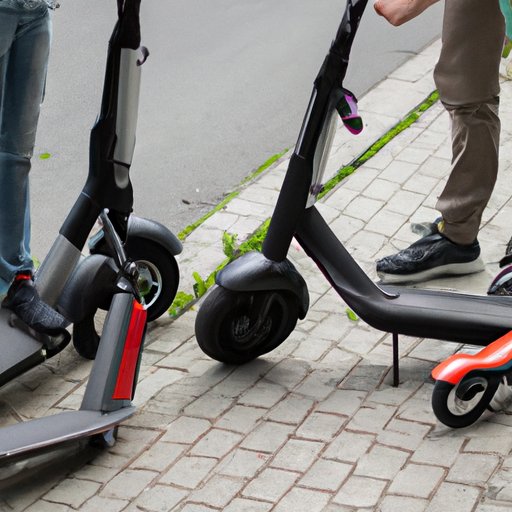Introduction
If you’re considering purchasing a scooter to assist with mobility, you’re likely wondering if Medicare will cover the cost. The answer to this question depends on many factors, including the type of scooter and your individual health care needs. In this article, we’ll explore the answers to this question in more detail and provide tips and resources to help you make the best decision for your specific situation.
Comparing Medicare and Private Insurance Coverage for Scooters
When it comes to scooters, both Medicare and private insurance have different criteria for coverage. Medicare is a federal program that provides health insurance to people age 65 and older and certain younger people with disabilities. Private insurance is a health plan provided by an employer or purchased directly from an insurance company. Depending on the type of plan you have, private insurance may provide more comprehensive coverage than Medicare.
What Medicare Covers
In general, Medicare does not cover the cost of purchasing a scooter. However, it can cover the costs associated with certain types of mobility equipment, such as wheelchairs and walkers, if medically necessary. Medicare Part B (Medical Insurance) typically covers 80% of the cost of durable medical equipment (DME), such as wheelchairs, walkers, and scooters, after you meet your deductible. Medicare Part C (Medicare Advantage Plans) also covers DME, but the coverage varies depending on the plan.
What Private Insurance Covers
Private insurance plans vary greatly, so it’s important to check with your insurer to determine what type of coverage you have. Some private insurance plans may cover the cost of a scooter if it is deemed medically necessary. Some plans may also cover the cost of repairs or accessories, such as batteries and chargers. Again, it’s important to contact your insurer to find out exactly what is covered.
Understanding What Medicare Covers for Mobility Equipment
Medicare covers certain types of mobility equipment if they are deemed medically necessary. To qualify for coverage, you must have a written prescription from your doctor for the specific type of equipment you need. Medicare will only cover items that are medically necessary for the diagnosis and treatment of a medical condition. The equipment must also be approved for use in the United States.
Types of Mobility Equipment Covered
Medicare Part B covers the rental or purchase of several types of mobility equipment, including manual wheelchairs, power wheelchairs, hospital beds, walkers, and crutches. Medicare Part C covers the same types of equipment, but the coverage may vary depending on the plan. Medicare does not cover the purchase of scooters, however, some Medicare Advantage plans may cover scooters.
How to Qualify for Coverage
To qualify for Medicare coverage of mobility equipment, you must have a written prescription from your doctor for the specific type of equipment you need. You must also meet certain criteria, such as having difficulty walking or standing due to a medical condition. Additionally, your doctor must certify that the equipment is medically necessary for your health and that it is the least expensive option available.

Exploring Other Options for Financial Assistance to Purchase a Scooter
If Medicare doesn’t cover the cost of a scooter and private insurance isn’t an option, there are still ways to get financial assistance to purchase one. Here are a few options to explore:
Grants and Loans
There are a variety of grants and loans available to help cover the cost of purchasing a scooter. Grants are typically awarded based on financial need and are often sponsored by organizations like the National Institutes of Health or the Department of Veterans Affairs. Loans are offered through banks and other lenders and require repayment.
Charitable Organizations
Charitable organizations, such as the Christopher and Dana Reeve Foundation, may provide financial assistance to those who need help purchasing a scooter. These organizations often offer grants, loans, and other forms of support for individuals with disabilities.
Investigating How to Get a Prescription for a Scooter
Before you can purchase a scooter, you must first get a prescription from a doctor. This prescription must include information about the type of scooter you need, its intended use, and any special features that may be necessary. Your doctor should also provide instructions on how to properly use the scooter.
Who Can Prescribe a Scooter?
A prescription for a scooter can be written by any doctor who is licensed to practice medicine in the United States. This includes primary care physicians, specialists, and physical therapists. It’s important to talk to your doctor about your specific needs before requesting a prescription.
Documents Needed for a Prescription
In addition to the written prescription, you may need to provide additional documents to purchase a scooter. These documents may include proof of income, medical records, and/or a letter from your doctor stating why the scooter is medically necessary. Be sure to check with your insurer or mobility equipment provider for a list of required documents.

Factors to Consider When Purchasing a Scooter with Medicare Coverage
If you’re able to get a prescription for a scooter and you’re eligible for Medicare coverage, there are several factors to consider when choosing the right scooter for your needs. Here are a few things to keep in mind:
Cost
The cost of a scooter can vary significantly, depending on the type and features. If you’re eligible for Medicare coverage, the cost of the scooter may be partially or fully covered. Be sure to check with your insurer or mobility equipment provider for details.
Weight Capacity
It’s important to choose a scooter that can handle your weight. Most scooters come with a weight capacity ranging from 250 to 500 pounds. Be sure to check the manufacturer’s specifications before making a purchase.
Battery Life
The battery life of a scooter is an important factor to consider. Most scooters come with batteries that last up to 10 hours. Look for a scooter with a longer battery life if you plan on using it for long periods of time.
Speed
The speed of a scooter can range from 4 mph to 8 mph or higher. If you plan on using the scooter outdoors, look for one that has a higher top speed. Be sure to check with your doctor to ensure the scooter is safe for your particular situation.

Tips for Finding the Right Scooter for Your Needs
Finding the right scooter for your needs can be challenging. Here are a few tips to help you make the best decision:
Taking Measurements
Before you start shopping for a scooter, take measurements to ensure the scooter you choose will fit in your home or other areas where you plan to use it. This includes measuring doorways, hallways, and any other areas where you plan to use the scooter.
Consulting with a Professional
If you’re unsure which type of scooter is best for you, consult with a professional. A mobility specialist can assess your specific needs and recommend the best type of scooter for your situation.
Considering Accessories
Scooters come with a variety of accessories, such as baskets, oxygen tanks, and cup holders. Consider these accessories when making your decision, as they can make your scooter more comfortable and convenient to use.

Exploring Additional Resources for Help Purchasing a Scooter
If you’re still unsure about how to purchase a scooter, there are a number of resources available to help. Here are a few to explore:
Local Mobility Shops
Many cities and towns have local mobility shops that specialize in selling and servicing scooters. These shops can provide expert advice and guidance on selecting the right scooter for your needs.
Online Retailers
There are a number of online retailers that sell scooters. Be sure to read customer reviews and compare prices before making a purchase.
Medicare Helplines
If you have questions about Medicare coverage for mobility equipment, you can call the Medicare helpline at 1-800-MEDICARE (1-800-633-4227). Representatives are available 24 hours a day, seven days a week.
Conclusion
In conclusion, understanding whether or not Medicare will pay for a scooter can be confusing. The answer depends on a variety of factors, including the type of scooter and your individual health care needs. It’s important to research your options and speak with a doctor or mobility specialist to determine the best course of action. There are a number of financial assistance programs, charitable organizations, and other resources available to help make purchasing a scooter more affordable. We encourage you to seek professional advice when making this important decision.
(Note: Is this article not meeting your expectations? Do you have knowledge or insights to share? Unlock new opportunities and expand your reach by joining our authors team. Click Registration to join us and share your expertise with our readers.)
